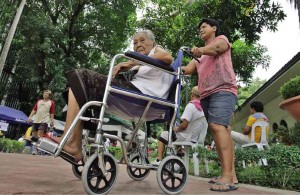MANILA, Philippines–The Philippines is primed to become one of the leading destinations in the world for nursing care, but the government must step up efforts and investments to build up capacities in the local medical field.
This will enable the country to keep pace with the global trends and become an even more attractive destination in the region, noted Marc Daubenbeuchel, executive director of the Retirement and Healthcare Coalition (RHC).
“The Philippines is on the right track in becoming a recognized player in this very new market. What needs to be done is capacity building in the medical field,” Daubenbeuchel said in a statement.
“The Philippines needs to upgrade its roster of geriatric doctors, which currently only totals 140 with no specialized geriatric nurses. This is mainly due to the lack of extensive geriatric courses that address proper long-term care including psychological care for dementia patients and their families,” he further explained.
If such issues are addressed, the Philippines could tap the lucrative opportunities presented by a rising demand from the United States and Europe for such nursing facilities, given the increasing costs for such services.
The Philippines already has a built-in advantage with its location, weather and the Filipinos’ fluency in English, which most of the other countries offering the same service does not possess, Daubenbeuchel explained.
At present, however, the country lags behind its neighbors in attracting foreign retirees to settle at nursing facilities.
In Asia, Thailand dominates the nursing care industry given government investments in medical facilities.
Daubenbeuchel, however, noted that there seems to be a built-in market for local senior citizens.
As it is, nursing homes have already been put up and are being built across the country. A nursing home for Germans has been put up in Iloilo while nursing homes for foreign retirees will soon rise in Cebu and Metro Manila.
More nursing facilities are expected to be built over the next several years with demand seen expanding “exponentially.”
“The total number of beds in private institutions quintupled in the last three years and about 80 percent of the bed capacity is now occupied by Filipino residents. This increase is a strong indicator that there is also a need for geriatric services for the local market,” Daubenbeuchel pointed out.
The RHC, spearheaded by the European, American, Japanese, and Korean chambers of commerce, is holding Wednesday its Retirement and Healthcare Master Class 2014. This event, in partnership with the Department of Tourism and Philippine Retirement Authority, will have internationally respected resource persons tackling various concerns on retirement and healthcare.
